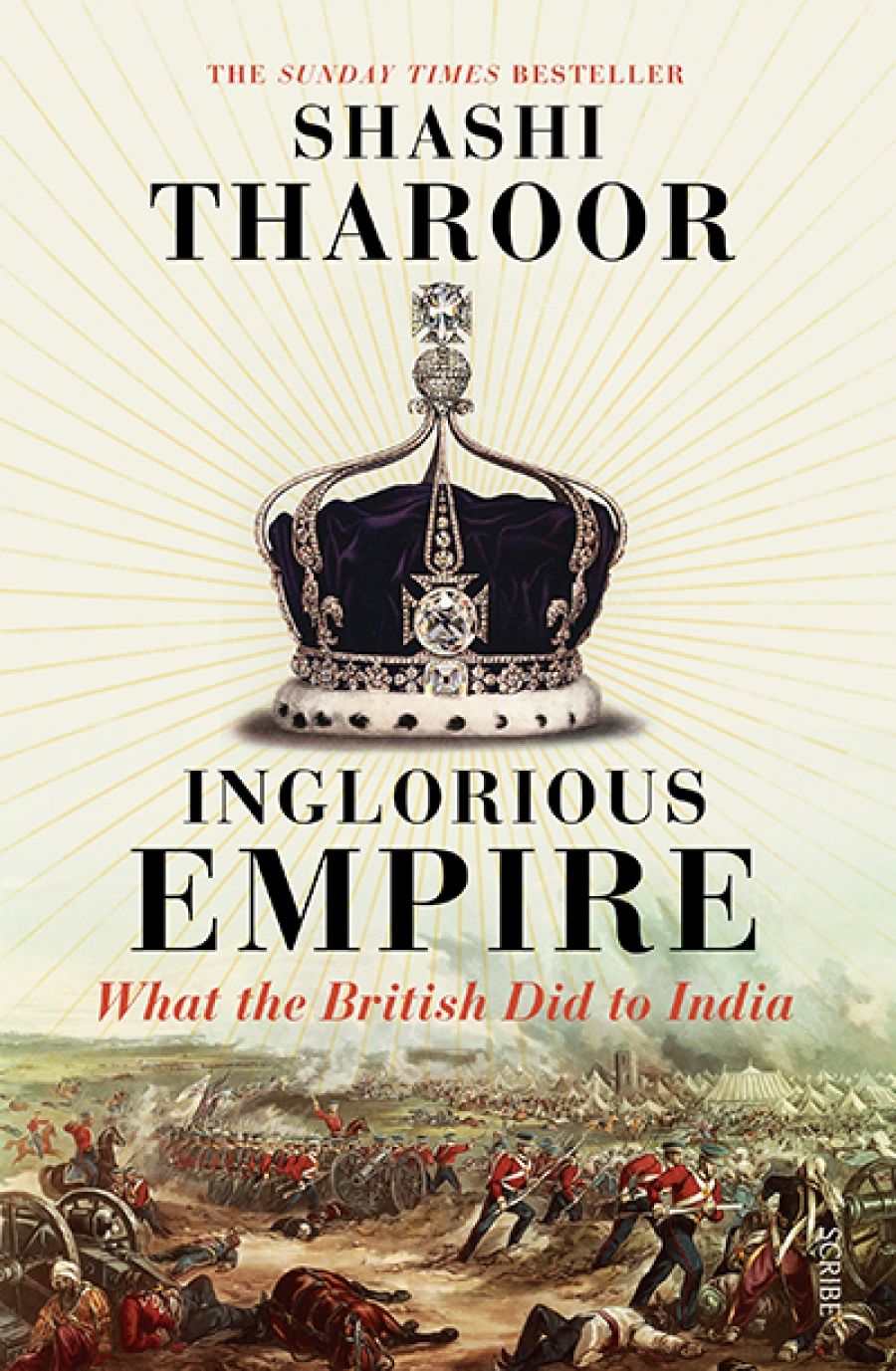
- Free Article: No
- Contents Category: India
- Custom Article Title: Mridula Nath Chakraborty reviews 'Inglorious Empire: What the British did to India' by Shashi Tharoor
- Custom Highlight Text:
For a book that began as a tweet, Shashi Tharoor’s Inglorious Empire: What the British did to India has had a remarkable journey, taking its best-selling author on a world tour, both to the centre of Empire in the United Kingdom, and its outpost in Australia. A career diplomat who retired as under-secretary general at the ...
- Book 1 Title: Inglorious Empire
- Book 1 Subtitle: What the British did to India
- Book 1 Biblio: Scribe $32.99 pb, 336 pp, 9781925322576
So what was so unusual about Tharoor’s most recent claim? Tharoor himself thought that ‘the arguments [he] was making were so basic that they constituted what Americans would call “Indian Nationalism 101” the fundamental, foundational arguments that justified the Indian struggle for freedom from British rule’. Indeed, any student of Indian history would find far more nuanced (and ambivalent) understandings of the legacy of two hundred years of the Raj, as it is known both by those who suffered under it and by those who betray a nostalgic yearning for the opulent old days. Tharoor definitively rejects all claims made on behalf of the ‘good’ the British Empire wrought in the subcontinent: the unification of ‘India’ itself and the bestowing on it of democracy, bureaucracy, English education, the rule of law and freedom of press, and, of course, the ubiquitous railways, cricket and tea, claims most egregiously made by pop historians like Niall Ferguson, whose Empire: How Britain made the modern world (2003) is subject to Tharoor’s special ire.
 A British man gets a pedicure from an Indian servant during the British Raj (Wikimedia Commons)
A British man gets a pedicure from an Indian servant during the British Raj (Wikimedia Commons)
Instead, Tharoor’s plea is a modest one, even a demand. In the Oxford speech, Tharoor made the case that as expiation for the wrongs committed by the British Empire, India would be content with ‘a symbolic reparation of one pound a year, payable for 200 years to atone for 200 years of imperial rule’. The book does not press for such filthy lucre (‘The sum would be larger than Britain’s entire GDP in 2015’); it would settle for ‘atonement’ or a ‘simple sorry’ on bended knees. With rapier-sharp wit and silver-tongued inventiveness, Tharoor takes upon himself the ‘moral urgency’ of raising the issue of the ‘moral debt’ Britain owes her former colonies. With facts, statistics, figures, and statements, meticulously researched from the annals of British and Indian history, Tharoor wields his sword with the surety of a fencer who knows that time and place are on his side. In the wake of an ignominious Brexit and the reorganisation of global geopolitics, what better time than now, when India is resurgent domestically and poised on the brink of imminent superpowerdom, to make a bloodless counterthrust into a mortally wounded opponent/lover?
 Shashi Tharoor (TED, Wikimedia Commons)
Shashi Tharoor (TED, Wikimedia Commons)
In the eight chapters that make up the book, Tharoor systematically disabuses his readers of any vestigial fondness they might have about the (infamous) British sense of justice and fair play, exposing instead the rapaciousness and ruthlessness with which the British found one of the largest economies of the world in the eighteenth century, and, within two centuries rendered its peoples poverty-and-famine stricken, its traditional socio-political systems broken, its thriving industries in textiles, jewellery, arts and crafts devastated, and its knowledge systems discredited Tharoor and his team of researchers have gathered their evidence painstakingly, and selectively, leaving no nugget of imperial scandal unexamined. If Empire is now a matter of collective amnesia in Britain, in Tharoor’s hands it also acquires somewhat of the flash of speculative fiction. Even as he counters each and every fantasy of Empire, Tharoor falters when faced with the question of historical inevitability. Perhaps India would have charted its own nativist path in the world without any British benevolence, thank you very much, but the moral force Tharoor is so insistent on exerting, flails in the face of the alarming inequalities of India’s post-colonial, and increasingly jingoistic, present. The task of revisionist history is not just to set the record straight, but also to present an equitable and plausible alternative. Treading too parlously in the realm of ‘what might have been,’ Tharoor’s argument, however compelling in its tweet-worthiness, loses the very moral ground he is insistent upon claiming. An opinion on history, however acutely revisionist, however attuned to the zeitgeist of the moment, is not history.


Comments powered by CComment